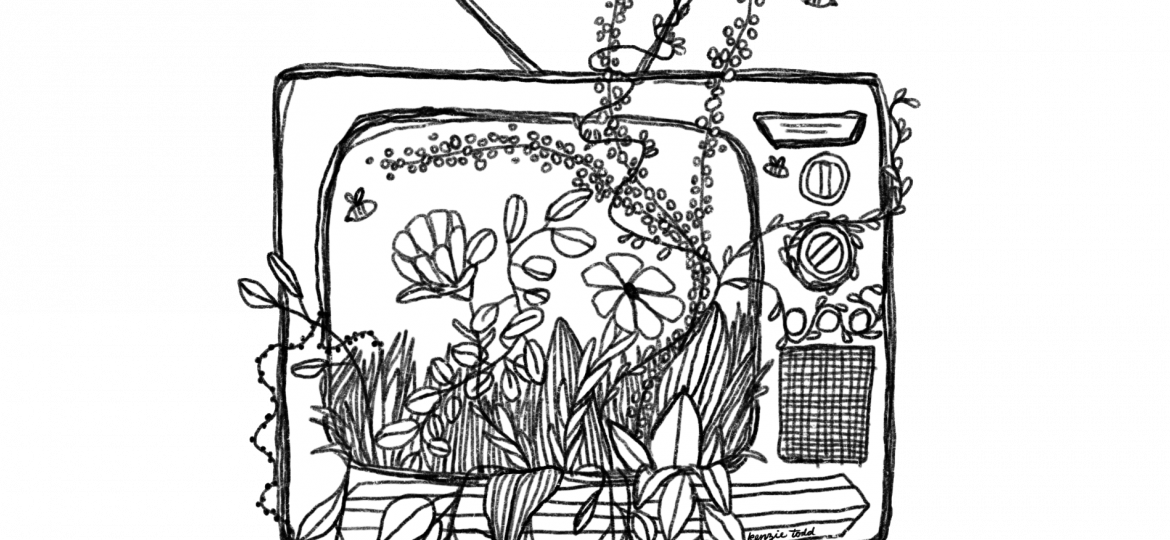
Illustration by Kenzie Todd
I think about “Curb Your Enthusiasm” literally all of the time. Its language has invaded my brain — every time I see someone execute a “chat and cut” at Stav, for example, or whenever I pass by someone I vaguely know and wonder, of course, if I need to do a “stop and chat.” HBO’s most successful comedy has given voice to my most devious, awkward, and antisocial impulses, and it has done the same for so many other people. With its last episode set to air on April 7, and in light of the recent death of one of its best actors, Richard Lewis, I want to get on the MediaBeat and bid farewell to television’s most iconic curmudgeon.
Having aired on-and-off for twelve seasons since 2000, “Curb Your Enthusiasm” is the second major TV project by “Seinfeld” creator Larry David. The show maintains the dedication “Seinfeld” had to being “about nothing,” featuring no overt morals or life-lessons, focusing instead on a cast of comedically antisocial characters as they get themselves into a variety of hijinks.
“Curb” is also structured in a completely different way from traditional sitcoms: famous for its improvisational structure, its scripts only contain loose outlines of ideas for plots. The actual scenes have no scripted dialogue. Instead, a cast of talented comics improvise scenes multiple times, and their best lines are edited together for the final cut.
The central appeal of the show, though, is Larry David’s portrayal of a fictionalized version of himself. His character constantly participates in and disrupts the social niceties of modern life in Hollywood. Seemingly insignificant perceived harms take on outrageous proportions in Larry’s mind — for example, the plot of Season 10 focuses on Larry’s efforts to open a “spite store,” a coffee shop that he uses to try and run the owner of a different coffee shop, who was once mean to him, out of business.
The other overarching element of Larry David’s persona is his inability to accept or successfully follow preconceived social rules. One of my favorite episodes involves him getting into an extended fight with a yoga teacher because he refuses to say “namaste” at the end of the yoga class — “I’m not a ‘namaste guy’… I don’t participate in group activities.” Other classics include an episode where he invites a registered sex offender to Passover Seder because the sex offender gave him a great golf tip.
Larry David’s character, for all his flaws, is certainly relatable. Even David himself has said to the Los Angeles Times that the show has “given me a little more liberty to behave in the way that the character behaves, which is the way I’d like to behave.”
In a recent red carpet interview, Larry David is asked what his favorite “Curb” episode is, and he responds “Palestinian Chicken,” referencing an episode where Larry begins going to an amazing chicken restaurant that is also run by anti-Semitic Hamas supporters, drawing the ire of his Jewish friends. In today’s political climate, answering a question with what is essentially an uncomfortably-timed joke about the Israel/Palestine conflict is the exact kind of awkward and socially-unaware thing that would happen on “Curb.”
But perhaps no one appreciates “Curb” like my father, who many of my friends have met and immediately referred to as an “Irish Catholic Larry David.” I think that being able to see a curmudgeonly, lovably awkward bald man on TV might actually be genuinely very meaningful to my dad, from a representation standpoint.
Part of the joy of “Curb” is the fact that it gives a voice to our worst social moments. When my dad brings up the “leprechaun waiter,” a ginger bartender at Tanzenwald who insulted him two years ago by calling him a “bald guy,” and who he still holds an incredible grudge against, or when he consistently tries to sneak out of Easter Mass right after Communion because we “already got what we came here for,” I can rationalize this behavior by calling it a “Curb” moment.
Ultimately, the success of “Curb” is a reflection of the fact that there’s a little Larry David in all of us. If we can’t always avoid our most antisocial, stubborn, and neurotic tendencies, then we can at least get a good laugh out of them.

